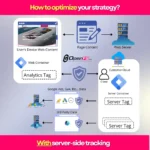Why AI SEO Tools Are Transforming Digital Marketing
Let me tell you something—I’ve been in the trenches of digital marketing for years, and nothing has shaken things up quite like AI-powered SEO tools. Remember when we’d spend entire days manually researching keywords, analyzing competitors, and trying to figure out what Google wanted? Those days are fading fast, and honestly, I’m not complaining.
The reality is that search engine optimization has become incredibly complex. Between algorithm updates, changing user behaviors, and the sheer volume of content online, keeping up manually just isn’t practical anymore. That’s where artificial intelligence steps in, acting like your personal SEO assistant who never sleeps and processes data at lightning speed.
Understanding How AI SEO Tools Actually Work
Think of AI SEO tools as your marketing team’s super-smart intern who reads everything, remembers everything, and spots patterns you’d never notice. These tools combine machine learning algorithms with traditional SEO techniques to deliver insights that would take humans weeks to compile. But here’s the kicker—they do it in minutes.
What really gets me excited is how these intelligent SEO platforms can predict trends before they explode. I’ve watched AI tools identify emerging keywords that hadn’t even hit mainstream search volumes yet. By the time everyone else caught on, my clients were already ranking for them. It’s like having a crystal ball for keyword strategy.
The Real Benefits of AI-Powered SEO Solutions
Let’s cut through the hype and talk about what these tools actually deliver. First off, automated keyword research has saved me countless hours. Instead of manually digging through search terms, AI analyzes millions of data points to find golden opportunities. Moreover, real-time content optimization means you’re not guessing anymore—you know exactly what changes will improve your rankings.
- Automated keyword research that uncovers hidden gems
- Real-time content optimization based on current ranking factors
- Predictive analytics that spot trends before competitors
- Intelligent competitor analysis revealing their winning strategies
- Automated technical SEO audits catching issues instantly
- Natural language processing for better content understanding
- Machine learning that improves recommendations over time
Top AI SEO Tools Worth Your Investment in 2025
After testing dozens of platforms and burning through trial subscriptions like coffee on a Monday morning, I’ve found the tools that actually deliver results. These aren’t just fancy dashboards—they’re game-changers that have transformed how I approach SEO tactics.
Surfer SEO: The Content Optimization Powerhouse
Surfer SEO has become my go-to for content optimization. What sets it apart is its ability to reverse-engineer top-ranking pages and tell you exactly what’s working. Need to know the optimal word count? Check. Wondering which related terms to include? It’s got you covered. The tool analyzes hundreds of ranking factors and presents them in a way that actually makes sense.
I recently used Surfer to optimize a client’s blog post that was stuck on page three. After implementing its suggestions—adjusting content structure, adding specific semantic keywords, and hitting the recommended word count—the post jumped to position four within two weeks. That’s the kind of result that makes you a believer in AI-powered optimization.
Semrush’s AI Writing Assistant: Your Content Creation Partner
While Semrush has long been the Swiss Army knife of SEO tools, their AI writing assistant takes things to another level. It doesn’t just help you write—it ensures your content hits all the right SEO notes while maintaining readability. The tool analyzes top-performing content in your niche and provides real-time suggestions as you write.
What I love most is how it balances SEO requirements with user experience. Too often, content gets stuffed with keywords and becomes unreadable. Semrush’s AI keeps you in check, suggesting natural ways to incorporate important terms while maintaining flow. It’s like having an experienced editor looking over your shoulder, but one who also happens to be an SEO expert.
Alli AI: Technical SEO on Autopilot
If technical SEO makes your head spin, Alli AI is your new best friend. This tool specializes in the nitty-gritty technical aspects that can make or break your rankings. From schema markup to site structure optimization, it handles the complex stuff that most marketers dread.
The automated implementation feature is particularly impressive. Instead of just telling you what’s wrong, Alli AI can actually fix many issues with a few clicks. I’ve seen it clean up messy site architectures and implement proper schema markup across thousands of pages in minutes. For agencies managing multiple clients, this kind of automation is invaluable.
Maximizing Your Results with Smart AI SEO Tools
Having powerful tools is one thing—knowing how to use them effectively is another. Through trial and error (and plenty of late nights), I’ve developed strategies that squeeze every drop of value from these AI platforms. The key is understanding that these tools amplify your expertise, not replace it.
Strategic Content Optimization with AI Insights
Start by conducting a comprehensive content audit using your AI tools. Don’t just look at what’s not working—identify your hidden champions. I often find pages that are ranking on page two for valuable keywords but just need a push to break through. AI tools excel at spotting these opportunities and suggesting specific improvements.
When optimizing existing content, focus on these areas:
- Content gaps where competitors are winning
- Underperforming pages with quick-win potential
- Long-tail keyword opportunities you’ve missed
- Technical issues silently hurting your rankings
- Internal linking opportunities to boost authority
- Outdated information needing refreshing
Leveraging AI for Advanced Technical SEO
Technical SEO can feel overwhelming, but AI tools turn complexity into clarity. They can analyze your entire site architecture and identify issues that would take days to find manually. More importantly, they prioritize fixes based on potential impact, so you’re not wasting time on minor issues while major problems persist.
Here’s what AI-powered technical optimization typically addresses:
- Site structure improvements for better crawlability
- Internal linking opportunities to distribute link equity
- Schema markup implementation for rich snippets
- Mobile optimization issues affecting user experience
- Page speed problems impacting Core Web Vitals
- Duplicate content and canonicalization issues
Integrating AI SEO Tools Into Your Marketing Workflow
The biggest mistake I see marketers make is treating AI tools as standalone solutions. They’re most powerful when integrated into your existing workflow. Think of them as team members who need clear roles and responsibilities, not magic bullets that work in isolation.
Building a Systematic Implementation Process
Success with AI SEO tools requires a methodical approach. Start small, master one tool at a time, and gradually expand your toolkit. Here’s the implementation process that’s worked best for my team:
- Begin with a comprehensive site audit using AI-powered analysis tools
- Identify and prioritize high-impact improvement areas
- Create a detailed optimization schedule with specific deadlines
- Monitor progress and adjust strategies based on AI insights
- Conduct regular performance reviews and strategy updates
- Document what works for future campaigns
Remember, these tools generate tons of data and suggestions. Without a clear process, you’ll drown in information paralysis. Focus on actionable insights that align with your business goals, not every metric the tool can produce.
Common Pitfalls When Using AI SEO Tools
Let’s be honest—AI tools are powerful, but they’re not infallible. I’ve made plenty of mistakes along the way, and I’d rather you learn from mine than repeat them. The biggest trap is becoming overly dependent on automation and forgetting that SEO is ultimately about serving human users.
The Over-Optimization Trap
Just because an AI tool suggests something doesn’t mean you should implement it blindly. I’ve seen websites tank their rankings by following every recommendation without considering context. AI excels at pattern recognition, but it doesn’t always understand nuance or brand voice.
Always filter AI suggestions through your understanding of your audience and brand. If a recommendation feels unnatural or forced, trust your instincts. For deeper insights on finding the right balance, check out our guide on everywhere optimization vs. SEO optimization.
Maintaining the Human Touch
While AI SEO tools provide incredible insights, they can’t replace human creativity and intuition. Your unique perspective, industry knowledge, and understanding of your audience are irreplaceable. Use AI to enhance your capabilities, not to abdicate your strategic thinking.
This balance becomes especially important when creating content. AI can suggest topics and keywords, but your expertise brings depth and authenticity that resonates with readers. Learn more about this crucial balance in our article on how Google understands SEO text.
The Future of AI in Search Engine Optimization
The AI revolution in SEO is just getting started. Based on current trends and insider conversations, here’s what’s coming down the pipeline. Natural language processing is becoming so sophisticated that AI tools will soon understand search intent better than many human marketers.
We’re also seeing AI tools that can predict algorithm changes before they happen by analyzing patterns in search results. Imagine adjusting your strategy proactively instead of scrambling after an update. Additionally, voice search optimization is becoming more intelligent, with AI helping create content that answers conversational queries naturally.
Emerging capabilities to watch include:
- Advanced natural language processing for better content understanding
- Predictive analytics that forecast algorithm changes
- Seamless integration with all major CMS platforms
- Sophisticated voice search optimization
- Hyper-local SEO targeting with AI precision
- Real-time competitive analysis and response strategies
- Automated A/B testing for SEO elements
Getting Real ROI from Your AI SEO Tools Investment
Let’s talk money—because these tools aren’t cheap. To justify the investment, you need to approach them strategically. Start by establishing clear KPIs that tie directly to business outcomes, not just vanity metrics. Traffic is great, but conversions pay the bills.
Focus your AI tool usage on high-value activities that directly impact revenue. For instance, optimizing product pages or key service descriptions often delivers better ROI than perfecting every blog post. Track which AI-driven changes lead to actual business results, and double down on what works.
To maximize your investment value:
- Set specific, measurable goals before implementing any tool
- Track ROI religiously—know what each tool delivers
- Stay current with updates and new features
- Combine complementary tools for comprehensive coverage
- Train your team properly—unused features are wasted money
- Regular audits to ensure you’re using tools effectively
Choosing the Right AI SEO Tools for Your Needs
Not every tool fits every situation. Small businesses might find enterprise-level platforms overwhelming and overpriced. Conversely, growing agencies need scalable solutions that won’t limit their potential. Consider your specific needs, budget, and technical expertise when selecting tools.
For small businesses just starting with AI SEO, I recommend beginning with one comprehensive tool like Surfer SEO or Semrush. Master it thoroughly before adding specialized tools. Agencies should look for platforms with white-label options and multi-client management features. Enterprise teams need tools that integrate with existing marketing stacks and offer advanced API access.
Real-World Success Stories with AI SEO Tools
Theory is great, but let me share some actual results. A local New Jersey retailer came to us struggling with online visibility. Using AI-powered keyword research, we discovered they were missing huge opportunities in voice search queries. After optimizing for conversational keywords suggested by our AI tools, their local search traffic increased by 150% in four months.
Another client, a B2B software company, was creating content blindly. AI content analysis revealed their blog posts were too technical for their target audience’s search queries. By adjusting content complexity based on AI recommendations, they saw a 200% increase in organic leads within six months. These aren’t isolated cases—they’re typical results when AI SEO tools are used strategically.
The key to these successes? Combining AI insights with deep understanding of the target audience. Tools provide the data and suggestions, but human expertise translates that into meaningful action. For more success strategies, explore our guide on proven SEO strategies to boost rankings.
Making AI SEO Tools Work for Your Business
As we wrap up, remember that AI SEO tools are exactly that—tools. They’re incredibly powerful when used correctly, but they’re not a substitute for strategic thinking and genuine expertise. The winners in tomorrow’s SEO landscape will be those who best combine AI capabilities with human insight.
Start small, measure everything, and scale what works. Don’t get caught up in the hype—focus on tools that solve real problems for your business. And always remember that behind every search query is a human looking for answers. Use AI to better serve those humans, and success will follow.
For comprehensive insights on modern SEO approaches, check out our guide on AI-powered SEO strategies for modern search success. If you’re looking to improve conversions alongside your SEO efforts, our conversion rate optimization services can help maximize your traffic’s value.
To deepen your SEO knowledge, explore our guide on why SEO is essential for business success. And if you’re wondering about timelines, don’t miss our realistic breakdown of how long SEO takes to rank.
Frequently Asked Questions
What exactly are AI SEO tools and how do they differ from traditional SEO software?
AI SEO tools use machine learning and artificial intelligence to analyze data, predict trends, and provide recommendations that traditional tools can’t match. While traditional SEO software relies on static rules and manual analysis, AI tools continuously learn from data patterns, adapt to algorithm changes, and can process vastly more information to deliver insights. They’re like having a data scientist working 24/7 on your SEO strategy, spotting opportunities and issues that human analysis might miss.
How much should I budget for AI SEO tools, and are they worth the investment?
Quality AI SEO tools typically range from $79 to $500+ per month, depending on features and scale. For most small to medium businesses, budgeting $200-400 monthly provides access to professional-grade tools. The investment is worth it if you’re serious about SEO—these tools can save dozens of hours monthly while delivering insights that directly impact rankings. Many businesses see positive ROI within 3-4 months through improved rankings and increased organic traffic.
Can AI SEO tools completely automate my SEO strategy?
While AI SEO tools are incredibly powerful, they can’t fully automate your SEO strategy—and you wouldn’t want them to. These tools excel at data analysis, pattern recognition, and suggesting optimizations, but they need human oversight for context, brand voice, and strategic decisions. Think of them as highly intelligent assistants rather than replacements for human expertise. The most successful SEO strategies combine AI efficiency with human creativity and market understanding.
Which AI SEO tool should I start with as a beginner?
For beginners, I recommend starting with either Surfer SEO for content optimization or Semrush for all-around SEO capabilities. Both offer intuitive interfaces and excellent learning resources. Surfer SEO is particularly beginner-friendly for content creation, while Semrush provides a comprehensive toolkit that grows with your skills. Start with one tool, master its core features over 2-3 months, then consider adding specialized tools based on your specific needs and growth.
 Written by: Romulo Vargas Betancourt
Written by: Romulo Vargas Betancourt
CEO – OpenFS LLC







